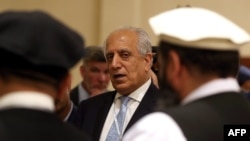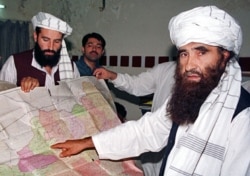A Taliban delegation reportedly met earlier this month with Zalmay Khalilzad, the U.S. special representative for Afghanistan reconciliation. The alleged gathering came during an official Taliban visit to Islamabad to meet with Pakistan officials.
It was the first known contact between the U.S and Taliban insurgents since U.S. President Donald Trump canceled peace talks with the insurgents in September, citing increased violence in Afghanistan perpetrated by the militants in an attempt to gain more leverage at the negotiation table.
A senior Pakistani official, who spoke on the condition of anonymity because he was not authorized to discuss the topic publicly, told Reuters “Pakistan played a big role in it to convince them [Taliban] how important it [the meeting] was for the peace process.”
The official said the meeting was a confidence-building measure between the two sides and did not include formal negotiations.
Although the U.S. State Department has declined to comment on whether Khalilzad met with the Taliban, a U.S. official told Reuters that Ambassador Khalilzad has met with Pakistan officials for consultations. The official said the peace talks have not resumed.
Taliban-al-Qaida links
The U.S. and Taliban have held nine rounds of direct talks in Qatar’s capital city, Doha, with both sides appearing closer than at any time in the past 18 years of war to striking a deal that would have brought an end to the conflict in Afghanistan, before President Trump called off the talks last month.
The deal revolved around four key issues negotiated by both sides for almost a year, including a guarantee by the Taliban insurgents that foreign militants would not be allowed to use Afghanistan as a safe haven to launch terror attacks outside the country, the complete withdrawal of U.S and NATO forces from Afghanistan, the beginning of an intra-Afghan dialogue, and a permanent cease-fire in the country.
Despite assurances by the insurgents that they would not allow foreign terror groups to operate from Afghanistan, the insurgent group seemingly is linked to the al-Qaida terror group on both operational and strategic levels.
Late last month, Afghan and U.S. forces jointly targeted a Taliban hideout in Afghanistan’s southern Helmand province, allegedly killing 23 militants, including six foreigners, and Asim Omar, chief of the al-Qaida terror group in the Indian Subcontinent (AQIS).
“On the 23rd of September, there was a special forces operation conducted against an al-Qaida hideout in the Musa Qala district of Helmand province that resulted in the death of 23 militants, including six al-Qaida fighters,” Mohammad Yasin Khan, governor of southern Helmand province told VOA.
Rohullah Ahmadzai, a spokesperson for the Afghan Ministry of Defense told VOA the Taliban and al-Qaida continue to maintain ties at various levels. He said Umar shows their relation is still firm.
“Unlike their [Taliban] claims and promise, they are in close relation with Al-Qaida in Afghanistan and their leaders live together outside Afghanistan,” he added in a reference to neighboring Pakistan, which is accused of providing safe haven for militants, a charge denied by Islamabad.
The Taliban predictably denied that the operation in southern Helmand province killed their members and those of al-Qaida, insisting the victims were all civilians.
Supporting hardliners
Javid Ahmad, a senior fellow at the Washington-based Atlantic Council, charges that al-Qaida continues to invest in Taliban, particularly the hardliners among the militant group.
“While Western targets have long been a priority for al-Qaida in Afghanistan, the group has largely focused the bulk of its attacks and resources on local operations, benefitting the Taliban hardliners,” Ahmad said. “The main problem is that some Taliban members can’t seem to distinguish their objectives from that of al-Qaida’s. To many, those objectives, long rooted in jihad, have remained the same.”
Ahmad notes the two sides rely on shared tactics, resources, expertise and manpower.
“There are also reports about a quiet rebranding of some of those hardliners into al-Qaida, which has solidified this co-dependent relationship. That’s why the Taliban promises to break ties with the group is a sheer fantasy for now,” Ahmad said.
Haqqani Network
Michael Semple, a professor at Queen’s University Belfast’s Institute for Global Peace, Security and Justice, says expecting the Taliban to give up on their relationship with their terrorist allies is “unrealistic.”
“In 25 years, the Taliban have not cut off links with al-Qaida and other terrorist groups. So, I have seen no indication that they are about to do so,” Semple said.
Semple added that the Haqqani Network, a Taliban allied U.S. designated terror group, has close working relationship with al-Qaida.
“The head of [the] Haqqani Network [Serajuddin Haqqani] is the deputy leader of the Taliban movement. The military might, which the Taliban deploys, depends partly on the Haqqani Network,” Semple said.
“We see no indication that the Taliban are ready to start, giving up their military and physical leadership … we are [a] long way away from peace agreement [between the U.S. and the Taliban] so to expect the Taliban to give up their relationship with their terrorist allies of two-and-half decades in the first step is probably unrealistic,” he added.
U.S. politics
Some analysts, like Matt Dearing, an assistant professor at the Washington-based National Defense University, assert that the Taliban should not be trusted and taken at their word for disavowing al-Qaida. Rather, they should be required to take “real action” before a deal is struck with them.
“Taliban and al-Qaida continue to coordinate operations, strategize, and praise each other on social media and their official communications. It’s not hard to see the links between these organizations if one pays attention,” Dearing said.
Dearing added that U.S. domestic politics should be separated from how its foreign policy is implemented.
“Unfortunately, the pressure to 'make a deal' with the Taliban before the summer of 2020 ended is based more on politics than policy. The Taliban know this, and their negotiators will tell the U.S. what it wants to hear,” Dearing said.
“It would be a disaster for U.S. foreign policy and Afghanistan’s future if a peace deal is struck with the Taliban purely for political optics,” he added.
VOA’s Afghanistan service contributed to this report. Some of the information in this report came from Reuters.






